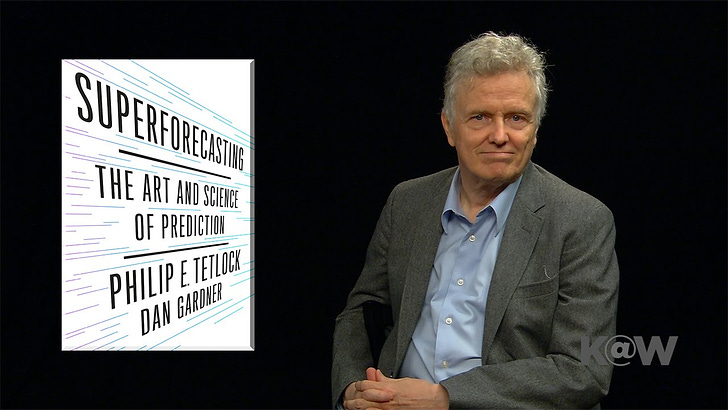Estimated reading time (5 minutes)
Happy Friday, everyone.
Welcome to Principles Friday, where I share one principle that can help you in your life or business, one thought-provoking question, and one call to action toward that principle.
Principle of the Week
“Beliefs are hypotheses to be tested, not treasures to be guarded." by Philip Tetlock.
Philip Tetlock is a renowned political psychologist and expert in decision-making. His groundbreaking research on political forecasting led to the development of the "Good Judgment Project," which aimed to improve the accuracy of predictions by aggregating the insights of diverse individuals.
One of the surprising findings from the project was that individuals who embraced an open-minded, evidence-based approach to their beliefs consistently outperformed experts who clung to rigid viewpoints. Tetlock's work highlighted the value of humility and intellectual curiosity in navigating complex and uncertain situations.
Philip Tetlock also co-authored "Superforecasters: The Art and Science of Prediction" by conducting extensive research and interviews with individuals who exhibited exceptional predictive abilities.
Tetlock and Gardner studied these "superforecasters," individuals who demonstrated a remarkable ability to predict future outcomes accurately. They delved into their strategies, thought processes, and methods of decision-making. The authors collected data over several years and analyzed the patterns that emerged from the predictions of these superforecasters. It explores the principles of probabilistic thinking, Bayesian reasoning, and intellectual humility, and how to apply these concepts to decision-making.
Small ask: 👉 If you enjoy reading this post, feel free to share it with friends! Or feel free to click the ❤️ button on this post so more people can discover it on Substack 🙏
Question to Ponder
In your journey through life or business, do you treat your beliefs as fixed treasures or as hypotheses open to testing and evolution? Consider the impact of maintaining an open and adaptable mindset regarding your beliefs.
Call to Action
Here’s a framework you can use today to be better at testing your beliefs:
Embrace Testability: Identify at least one significant belief and reframe it as a testable hypothesis. Ask yourself: "What would convince me that I'm wrong about this belief?" Superforecasters, for instance, frame their beliefs as testable hypotheses by assigning numerical probabilities to different outcomes. For example, instead of stating, "I believe this stock will go up," they would say, "I believe there's a 70% chance this stock will go up."
Practice Bayesian Thinking: Take a Bayesian approach to your decision-making. When faced with important choices, attach numerical probabilities to different outcomes based on the evidence you have. Continuously update these probabilities as new information emerges. Superforecasters continuously update their beliefs based on new information. If a forecast about a political event has a 60% chance of happening, but new evidence emerges that supports it, they adjust their probability estimate upward to reflect the increased likelihood.
Engage in Intellectual Humility: Challenge yourself to engage in discussions where you actively seek out opposing viewpoints. Practice explaining your beliefs to others through testable predictions, and be open to adjusting your beliefs in response to thoughtful feedback. Rather than defending their original positions, superforecasters actively seek out differing opinions and consider how those opinions might impact their predictions. This willingness to consider alternative perspectives enhances their accuracy.
Learn from Superforecasters: Explore the concepts of "superforecasting" and how Bayesians approach predictions. Investigate how these methods can enhance your decision-making process. For instance, when faced with geopolitical events, superforecasters would break down their predictions into smaller components, analyze historical data, and factor in expert opinions to arrive at more accurate probabilities.
Cultivate Growth through Feedback: Embrace the idea that beliefs should be refined through testing, just as scientific hypotheses are. View the process of challenging your ideas as an opportunity for growth and intellectual development. Superforecasters demonstrate humility by embracing feedback and being willing to change their beliefs in response to new information. This adaptability enhances their predictive accuracy over time.
Video of the Week
Why an Open Mind Is Key to Making Better Predictions
If you want to learn more principles, I interview founders on my podcast, The First 100, where they share how they acquired their first 100 paying customers. This week:
Episode 90 - The First 100 with Tony Beltramelli, CEO and co-founder of Uizard
Things I Came Across This Week
Extra Points is a newsletter that covers the off-the-field forces that shape college athletics. From NIL to federal legislation, conference realignment to TV deals, nobody covers the game-within-the-game like Matt Brown. With original reporting, unique analysis, and content you can't get anywhere else, Extra Points will make you a smarter college sports fan or industry professional. Subscribe Here Today.
And that’s a wrap for now!
Thank you for giving your attention and checking this edition out.
If you enjoyed this edition, it would MEAN A LOT to me if you could take a few seconds and help me by sharing this article with your friends.
If you are not a subscriber, sign up and join others who receive it directly in their inbox weekly.



